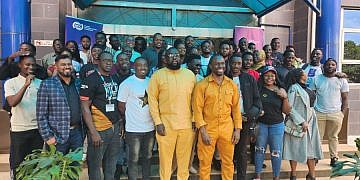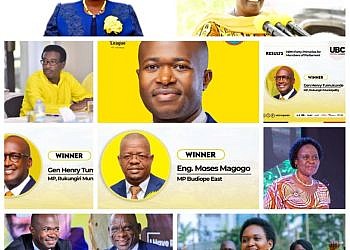Hollywood star Gbenga Akinnagbe, internationally acclaimed for his role as Chris Partlow in HBO’s The Wire, is in Uganda to engage with local filmmakers and support the country’s fast-growing film sector.
On Saturday, Akinnagbe held an in-depth exchange with actors, producers, and industry stakeholders at UCC House in Bugoloobi, in a forum hosted by the Uganda Communications Commission (UCC) in collaboration with the Office of the President – Diaspora Affairs, led by Ambassador Abbey Walusimbi.
His visit forms part of a broader initiative to elevate Uganda’s creative economy, promote authentic African narratives, and explore investment opportunities in film production and distribution.
“Tell Ugandan Stories in Ugandan Languages”
During an interactive Q&A session, Akinnagbe urged filmmakers to take pride in their cultural roots by telling stories in native Ugandan languages—a strategy he said could distinguish Ugandan content in the global market.
“Uganda has beautiful, tragic, and heroic stories about the human experience,” he said. “I highly recommend that Uganda also make stories in their own native languages. That’s what attracts international markets.”
He noted that several U.S.-based studios are actively seeking African stories, particularly those grounded in local culture and told with authenticity.
“There are so many film companies in the U.S. talking about how to get stories from Africa. Keep working. Improve the quality. The opportunities are there.”
Akinnagbe emphasized that craft should take precedence over networking and financing, advising creatives to focus on improving their storytelling and production skills.
“Most people chase financing and networking. But craft is the most important. If you can’t make anything good, no one will relate to it,” he said. “Work on your craft—the network will come. Trust the process.”
He also called attention to the lack of formal industry structures in Uganda, particularly the use of contracts, which he described as essential for protecting creatives and investors alike.
“Most people here work without contracts. But as the industry grows, that must change. Necessity is the mother of invention.”
Despite being in the country for only a few days, Akinnagbe expressed a strong emotional connection to Uganda.
“I’m already in love. The people are amazing. Africa is my own. Uganda is my own. Anything I can do to shine a light on the amazing stories and people here—I’ll do it.”
He thanked Ambassador Walusimbi and the Office of the President for what he described as “brilliant creative partnerships.”
“Everyone I’ve met here is brilliant. These are the minds we can rebuild Africa with.”
Isaac Kigozi, Senior Principal Trade and Investment Officer at the Office of the President – Diaspora Affairs, emphasized that knowledge and networking are just as critical as funding for the creative sector’s growth.
“In most cases, people ask for money, forgetting that knowledge is much better,” Kigozi said. “Money is good, but the network is very important. Engagements like this are transformative.”
He praised UCC and Ambassador Walusimbi for their continued efforts in positioning Uganda’s film industry on international platforms.
Leonard Amanya, Marketing and Promotions Officer at UCC, reiterated the Commission’s goal of building industry capacity through global exposure and meaningful partnerships.
“By inviting Gbenga Akinnagbe, we’re exposing our talent to global talent,” she said. “It’s not just about UCC—it’s about building jobs and opportunities across the whole creative ecosystem.”
Matthew Nabwiso, renowned filmmaker and President of the Uganda Producers Guild, welcomed the engagement, noting its value in bridging the gap between local creators and international professionals.
“Engagements like this allow us to learn from people who’ve been in bigger industries. They share our challenges and how to overcome them.”
He also encouraged filmmakers to join the collecting society that manages royalty distribution, warning that failure to register means missing out on earnings.
“If you’re not a member, when royalties are collected, you won’t be paid. It’s important to protect your work.”
Akinnagbe’s visit has ignited fresh optimism across Uganda’s creative sector, highlighting the potential of local stories, structured industry systems, and international partnerships to propel Ugandan cinema onto the global stage.









































